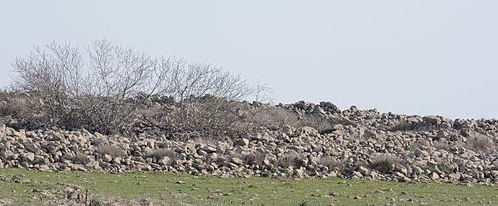The Lord said to Joshua, “Today I have rolled away from you the disgrace of Egypt.” And so that place is called Gilgal to this day.
Today’s reading is about a time just between Israel’s forty years of wandering in the wilderness and their possession of the Promised Land. It was one of those in-between times. They were no longer traveling, but they weren’t home yet either.
The Israelites had been wandering in the wilderness for a long time. In fact, none of those who crossed the Red Sea with Moses were alive to cross the Jordan with Joshua. The people in today’s reading didn’t remember the days of slavery, nor did they have first-hand memories of their flight out of Egypt or the miracles that propelled their people into the desert. In the forty years of wilderness wanderings, they had lost sight of their special relationship to Yahweh, forgotten who they were, and were probably wondering what they were doing in the wilderness eating manna day after day. Even miracles go stale if you have them every day.
Before they took possession of the promised land the Israelite’s shame had to be rolled away. The Hebrew word for rolled away and for Gilgal both have the same consonants, a gimmel, a lamed, a gimmel and another lamed. So, you know that everything that happened at Gilgal had something to do with rolling away Israel’s shame. That’s not just a throw-away line to introduce the main text. That is the line that tells you what the text is about.
The shame of Israel was not that they’d wandered for so very long, nor was it that they were not circumcised. The shame of Israel was that they’d forgotten who they were, and who they belonged to. At the heart of shame, there’s an event which causes us to forget who we are and to start believing something else. These events at Gilgal are a time for Israel to stop and remember who they are.
Sometimes we know who we are. It seems clear. It’s as if there are angels always whispering of compassion and mercy, and we seem to have a clear direction and know just what to do and where to go. But, things happen. We forget. Maybe something happens that shames us, or maybe we just forget. Sometimes it’s hard to hear the angels whispering, even if they are. Sometimes we don’t know what we’re doing, nor can we remember why.
In those times when we can’t hear God, when the manna isn’t falling, we have to rely on memory. <br?
That’s what Passover is all about: Remembering.
That’s what Passover is all about: Remembering.
We tell stories, ask questions, and learn again who we are. That is why, before they began their adventures in the Promised Land, God commanded the Israelites to observe Passover.
If you had your own Passover meal, if you sat down with a few friends to tell stories, the kinds of stories that remind you of who you really are, what would you tell? Could you tell about a time when you felt trapped, but were delivered; or tell of a time when Torah burned in your heart? What songs would you sing? What would you say about the wine? Would you invite a saint or one of the prophets to join you?
If you are wandering, unsure of your next steps, if you’ve forgotten what you’re doing, or why it matters, or maybe you just don’t feel loved the way a child of God should, then I’ve got good news for you: Passover’s here! Each Sunday morning we have a chance to stop and remember who we are. We tell stories, sing songs, and eat a special meal.
Actually, Passover is not until April this year, but you can remember your stories anytime. Sunday, or Monday… any day. Listen carefully to the stories told around the altar, and around the coffee pot and the kitchen table too. Tell your own stories and listen to your friend’s stories. Those are the stories that will help you remember again that you are a loved child of God.
Remembering, telling, being with others are what roll away the shame and help us remember again.
Linda McMillan lives in Shanghai, China
Image: By Staselnik (Own work) [CC BY-SA 3.0], via Wikimedia Commons

